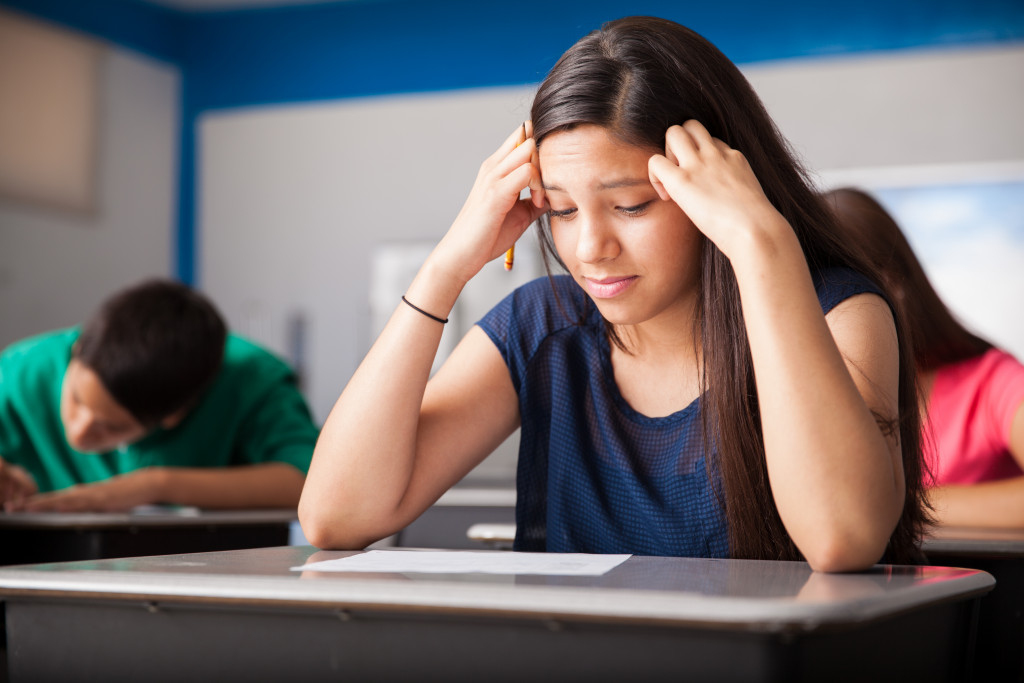 Florida’s Reading test results in the National Assessment for Education Progress (NAEP) weren’t all bad news, but things look much worse for Math scores.
Florida’s Reading test results in the National Assessment for Education Progress (NAEP) weren’t all bad news, but things look much worse for Math scores.
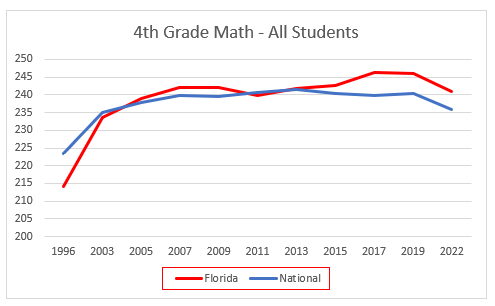 Where Florida’s fourth-grade Reading test scores dropped by an average of 0.6 points across all subgroups, students lost an average of 5.2 points in fourth-grade Math. The results were even worse for eighth graders.
Where Florida’s fourth-grade Reading test scores dropped by an average of 0.6 points across all subgroups, students lost an average of 5.2 points in fourth-grade Math. The results were even worse for eighth graders.
It’s worth noting that Florida’s declines in NAEP Math scores mirrored the declines seen in the national average, but that average is both richer and whiter. When adjusting for race and income, Florida tends to dominate the national rankings, while Florida’s Reading performance tops the charts.
Despite being a majority-minority state – Florida has a larger than average low-income student population – the state’s fourth-grade students beat the national average in Math. Florida’s learning loss was about the same as the national average, with students losing 5.1 points compared to a 4.6 decline nationally, the equivalent of losing about a half year of learning.
Florida’s white fourth-grade students lost 1.1 points compared to 3.1 points nationally.
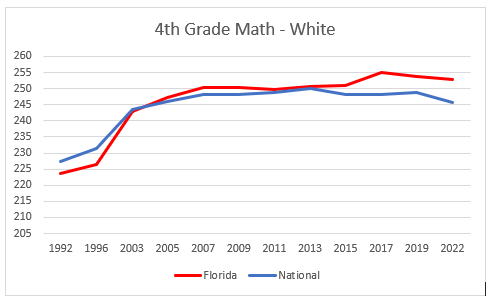 Unlike the more uniform learning losses for Reading, Florida’s minority students saw a larger learning loss in Math than white students. Fourth-grade Hispanic students in Florida and nationally lost about the same 6.4 points compared to 6.5 points.
Unlike the more uniform learning losses for Reading, Florida’s minority students saw a larger learning loss in Math than white students. Fourth-grade Hispanic students in Florida and nationally lost about the same 6.4 points compared to 6.5 points.
Black students in Florida lost 7.5 points compared to 7.4 points nationally. Both Black and Hispanic students lost about a half year of learning according to the fourth-grade math scores.
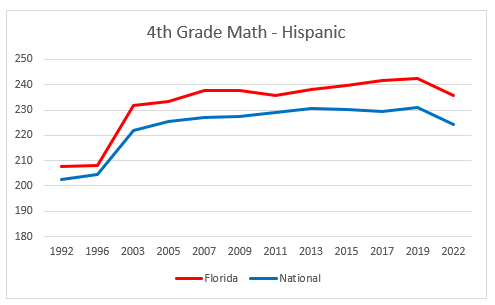
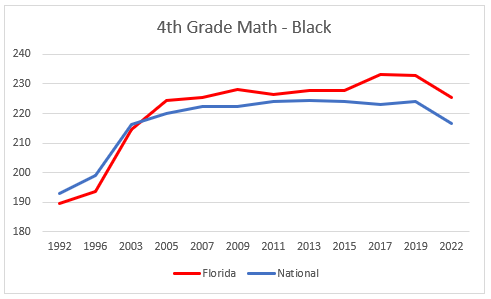 Low-income students, defined as students eligible for free or reduced-priced lunches, saw a 6-point learning loss compared to 6.2 nationally. Overall, Florida’s low-income students still score 10 points more — about a grade level higher — than their counterparts nationally.
Low-income students, defined as students eligible for free or reduced-priced lunches, saw a 6-point learning loss compared to 6.2 nationally. Overall, Florida’s low-income students still score 10 points more — about a grade level higher — than their counterparts nationally.
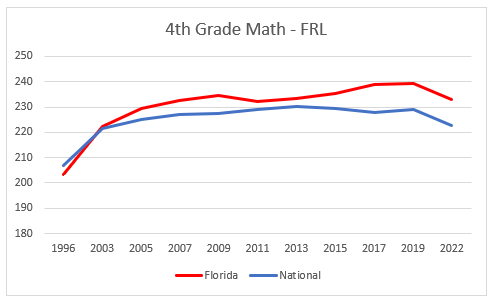 Research shows that without a strong foundation in early grades, older students have to play catch up. That is true with Florida. The state’s overall student population is now about 3 points behind the national average.
Research shows that without a strong foundation in early grades, older students have to play catch up. That is true with Florida. The state’s overall student population is now about 3 points behind the national average.
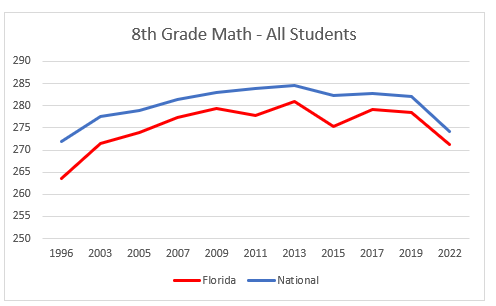 Students nationally saw a slightly larger decline at 7.7 points of learning loss compared to 7.3 points in Florida. A 7- to 8-point decline means students lost almost a year’s worth of learning between 2019 and 2022.
Students nationally saw a slightly larger decline at 7.7 points of learning loss compared to 7.3 points in Florida. A 7- to 8-point decline means students lost almost a year’s worth of learning between 2019 and 2022.
Florida’s white eighth-grade students perform below the national average in Math. Florida students saw a 7.3-point decline compared to 7.6-point decline compared to the national average.
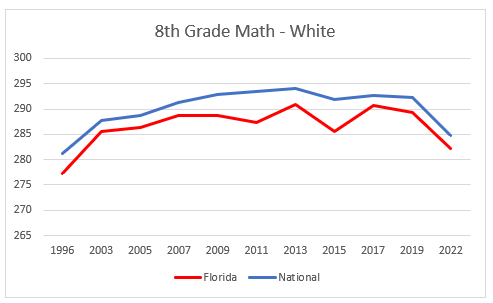 Florida’s black students performed slightly better than their peers nationally and lost 4.6 points compared to 6.8 points nationally.
Florida’s black students performed slightly better than their peers nationally and lost 4.6 points compared to 6.8 points nationally.
Hispanic students also performed better than their peers nationally, scoring about half a grade higher. However, Florida’s Hispanic eighth-grade student population lost 8.8 points compared to 6.8 points nationally.
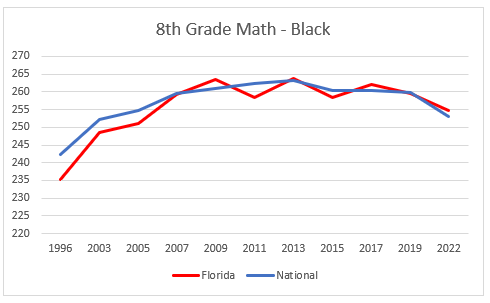
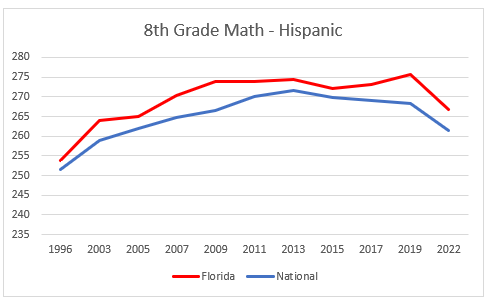 Eighth graders eligible for free or reduced-priced lunch barely edge out the national average in raw scores and in learning losses. Florida’s low-income eighth graders lost 5.6 points compared to 6.7 points nationally.
Eighth graders eligible for free or reduced-priced lunch barely edge out the national average in raw scores and in learning losses. Florida’s low-income eighth graders lost 5.6 points compared to 6.7 points nationally.
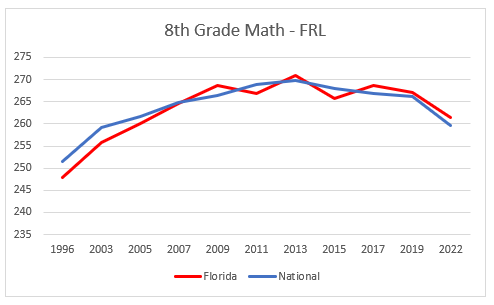 Florida students tended to have smaller learning losses than the national average. Low-income and minority students in Florida also tended to perform better than their peers nationally.
Florida students tended to have smaller learning losses than the national average. Low-income and minority students in Florida also tended to perform better than their peers nationally.
Looking at raw scores, Florida bests the national average in 8 out of the 10 subgroups examined above. Only eighth grade students overall and eighth grade white students lose out to the national average. The national average, however, shows stronger learning gains between fourth and eighth grades.
 Subgroups nationally have nearly a difference of four grades in learning between fourth and eighth grade, while Florida tends to have about a three grade level difference.
Subgroups nationally have nearly a difference of four grades in learning between fourth and eighth grade, while Florida tends to have about a three grade level difference.
Overall, viewing Florida’s fourth and eighth grade math scores confirms that the state does a great job educating students in early grades, but the rest of the nation is able to catch up by the time students reach eighth grade.


